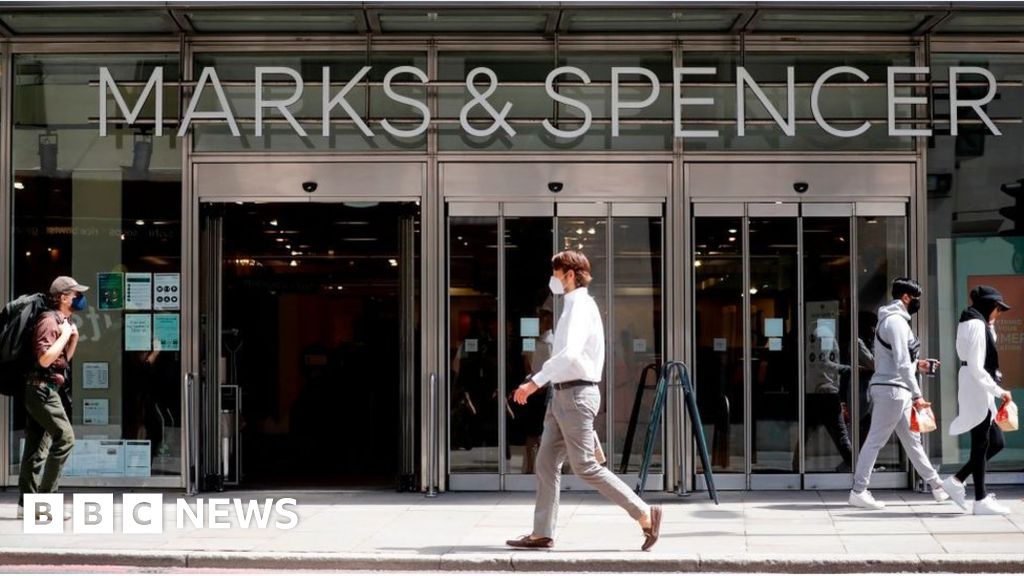M&S: Five reasons the retailer is struggling

Marks & Spencer announced on Monday that it was bringing forward a plan to cut jobs due to the pandemic, with 950 roles set to go.
It is just the latest sign of trouble facing the iconic British retailer, whose sales and popularity have fallen sharply in recent years.
The firm says it was starting to get its house in order before the pandemic and was hit like any other retailer by the recent downturn.
But retail experts say its problems date back much further, and that the following criticisms still weigh heavily on the High Street giant:
1. ‘M&S doesn’t appeal to any generation’
While M&S’s food sales have recently picked up, its fashion sales have remained in the doldrums.
The retailer has long been accused of selling clothes that are boring or conservative, and of not knowing who its key demographic is.
«In trying to be everything to everyone, they’ve ended up being nothing to no one,» says Natalie Berg, retail analyst at NBK Retail.
Retail expert Kate Hardcastle agrees: «Generally they have got a 25-year-old model wearing garments targeted at a 65-year-old, who doesn’t feel included.»
However, the firm says it is changing. It recently strengthened its leadership team – bringing in Richard Price as managing director of clothing from Tesco clothing and Stephen Langford from Asda as director of M&S.com.
Since lockdown it says it has seen more than 700,000 new downloads of the M&S.com app – something it says proves it is on track to becoming a «digital first» business that reaches a wider demographic.
2. ‘M&S too often makes bad decisions’
Another point experts agree on is that it is often hard to understand the thinking behind some of the business decisions M&S has made over the years.
One example is the Sparks Card customer loyalty scheme, launched in 2015, which was unsuccessful and has just been re-launched this month.
«Because they were so late to market with the rewards scheme, they had a significant amount of time to watch what best practice was and even improve on it, but they did it the M&S way,» says Ms Hardcastle.
Retail Analyst Chris Field has doubts about M&S’ decision to purchase a 50% stake in online supermarket Ocado, following claims it overpaid for the business.
«The money they spent on Ocado, that must have hurt, and there’s no proof there will be a return,» he says.
But M&S says the pundits are wrong. It points out it re-launched the Sparks scheme after consulting more than 250,000 of its customers.
And it says that Ocado – whose own sales jumped 40% in May – will help to boost the M&S food business.
«When we did the Ocado acquisition… I think it’s fair to say that shareholders were pretty divided… We’re not hearing any scepticism now,» said chairman Archie Norman at the firm’s annual general meeting earlier in July.
3. ‘M&S doesn’t listen to its customers’
Some retail experts say M&S’ central problem is that it doesn’t listen to its customers, and isn’t really engaging with any demographic.
«They don’t connect with customers enough, so they never know what the customers want,» says Ms Hardcastle.
In particular, she thinks M&S’ traditional base of over-45s feels neglected.
When M&S made the decision to remove the free biscuits it provided with teas and coffees in its cafes, it triggered accusations of «stinginess» from upset consumers.
The firm says it was merely trying to reduce food waste and that biscuits are still available free to those who ask.
But the move made headlines and Ms Hardcastle suggests it was handled poorly, given that «successful brands excel in making fans out of consumers».
4. ‘It needs to invest more in its stores’
«If you were launching a retail business today, you wouldn’t dream of recreating the M&S model,» says Ms Berg. «We don’t go into department stores anymore.»
Mr Fields meanwhile says going to M&S is no longer an enjoyable experience: «Old mens clothes, next to mens suits, next to pants, next to childrenswear makes no sense anymore.»
This is a worry in an intensely competitive retail climate, he says. However, M&S says «creating a store estate for the new world» is a key part of its transformation plan.
Many expect it will become more of a food than clothing business in the future. And certainly the retailer has shown willingness to embrace change.
In May, in response to the pandemic, it launched its «Never the same again» programme which aims to use the lessons of the crisis to «radically accelerate the pace and ambition of its transformation plan».
«While some consumer habits will return to normal, other have been changed forever,» it said.
5. ‘Iconic but not immune’
Despite their collective frustration and confusion with the retailer, none of the retail experts the BBC spoke to deny that M&S is still a powerful brand.
«In all of my years commentating on retail, I’ve never seen such an outpouring of emotion in a brand,» says Ms Hardcastle.
«People loved them and what they stood for. They traded on that emotion, but they’ve not invested in the brand for so long, and that’s why people get mad and sad about it.»
The retailer is still trusted – on KPMG’s recent Customer Experience Excellence List, M&S came in ninth.
M&S is also credited as being the British firm that «invented» the concept of corporate and social responsibility, which has earned it much goodwill from consumers.
«They have trust, and they need to use all that good will to sharpen the offer,» says Mr Field.
Ms Berg agrees but says M&S must learn some hard lessons if it is to survive. «They’re an iconic brand but they’re not immune to the problems the sector is facing – the future for M&S is far fewer stores, but better stores.»


